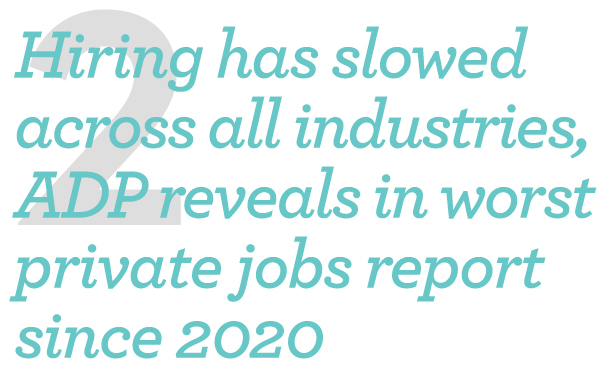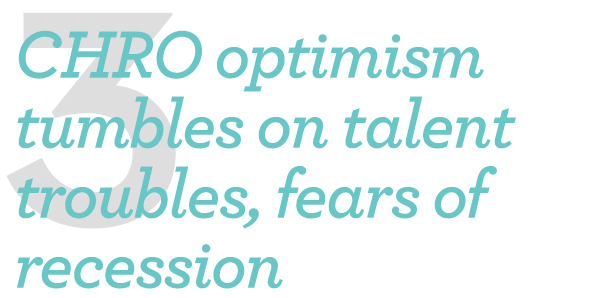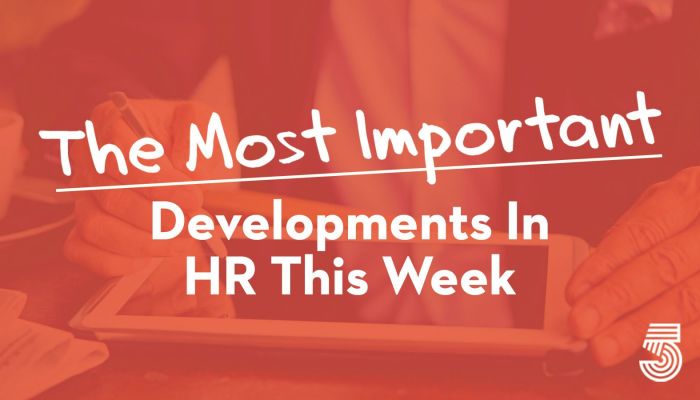The M.I.D., as we call it, is curated by our editorial team from more than 50 news sources. Like a lot of good ideas, this started as something I wanted for myself. If I can’t read everything, I at least want to stay abreast of the most important developments.
This week in HR, Elon Musk told employees to come back to the office or quit as layoffs hang in the balance, an ADP report spelled bad news for small business, CHRO optimism tumbled, geographic pay was debated, and CA court overturned the law requiring women on boards of directors.


CEO Elon Musk demanded that Tesla employees must return to the office for in-person work at least 40 hours per week or they’ll be let go. News of the policy was disclosed in a series of leaked emails Musk sent on Tuesday, according to electric car news site, Electrek. “Anyone who wishes to do remote work must be in the office for a minimum (and I mean *minimum*) of 40 hours per week or depart Tesla. This is less than we ask of factory workers,” Musk wrote. The billionaire added that employees’ offices must be a “main Tesla office, not a remote branch office unrelated to the job duties,” Electrek reports. In an email, Musk said he would directly review and approve any requests for exemption from the company’s return-to-work policy, but emphasized to his staff: “If you don’t show up, we will assume you have resigned.” Tesla did not respond to NPR’s immediate requests for comment. However, in a reply to one user on Twitter who asked Musk about the leaked emails, he responded back saying, “They should pretend to work somewhere else.” NPR


As looming interest rate hikes fuel uncertainty over the economic recovery, private U.S. employers posted their worst monthly job growth in more than two years on Thursday, according to payroll processor ADP, which notes that prolonged inflation and the resulting central bank policy could be starting to temper growth in the red-hot labor market. Dragged down by 91,000 lost jobs among small businesses, private employment increased by 128,000 jobs from April to May, according to the ADP’s National Employment Report released Thursday — the slowest pace since COVID lockdowns led to widespread unemployment in April 2020 and far below economist projections calling for 300,000 new jobs. The rate of hiring has “tempered across all industries,” ADP Chief Economist Nela Richardson said in a Wednesday statement, calling small businesses in particular a “source of concern as they struggle to keep up with larger firms that have been booming as of late.” Job loss was worst among businesses with less than 20 employees, which saw employment fall by 78,000 workers in April, while medium businesses and large businesses added 97,000 and 122,000 jobs, according to ADP. Forbes


People shortages, high turnover rates, and a deteriorating economy have America’s chief HR officers increasingly concerned, according to our latest StrategicCHRO360 survey. The Q2 survey, of 220 U.S. Chiefs of HR conducted May 17-20, shows ratings of future business conditions is now at 6.1 out of 10 — measured on a 10-point scale where 10 is excellent — compared to 6.7 out of 10 in quarter one of this year. This quarter’s rating is down over 20% from their outlook this time last year. CHROs’ rating of current business conditions dipped only slightly this quarter, down 1% to 6.3 out of 10 — 14% below their rating of current conditions one year ago. Donna Manion, VP of HR at GSP Retail, an industrial manufacturing firm, says, “Much depends on the economy and global concerns, but I believe conditions in the US will slowly improve.” She is hopeful that conditions will improve over the next year and elaborates, “Businesses are driving innovation at a fierce pace. If the inflation rate starts to come down, we could see improvements beyond expectations. But patience and resilience will be required to arrive at the new workplace.” Strategic CHRO360


With many workers opting to continue working out of the office, 28% of organizations in the United States plan to modify their policies through consolidation of pay differentials, according to a report from WorldatWork. Another 13% are considering eliminating differentials by geographic area. “Geographic pay policies have existed for many years but in the past were more about an organization’s multiple physical work locations rather than where the work was being performed, including employees’ homes like with remote work,” says Alicia Scott-Wears, WorldatWork director for total rewards content. “With the increase in remote work over the past two years, these philosophies and policies have required more attention and communication.” Currently, 24% of U.S. employers say their base pay is dependent on location, down from 33% in 2021. Meanwhile, 25% say the same is not dependent on location, up from 19% from last year. Human Resources Director


A recent ruling in Los Angeles Superior Court overturned California’s law requiring companies to include women on their boards of directors. The court found that the state’s gender diversity rule violates the equal protection clause of the California Constitution. The court’s decision prevents the law from being enforced. The court case is likely to go to appeal. “The Secretary of State has indicated the state will appeal the order, which will then put the case in the California Court of Appeals,” said Ian Michalak, a Los Angeles-based attorney with Sheppard Mullin. Women and racial minorities tend to be underrepresented on corporate boards of directors, not just in California but across the country. The California law sought to increase diversity on corporate boards of directors generally. After California passed the law in 2018, taxpayers sued, arguing that it violated the state’s equal protection law by creating a gender-based quota system that would impact men and women unequally. California argued that eliminating and remedying discrimination in selecting boards of directors is a compelling state interest. It also claimed that the gender requirement would benefit the public and the state economy. SHRM










